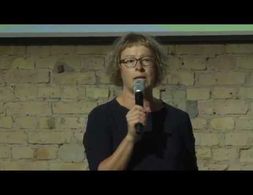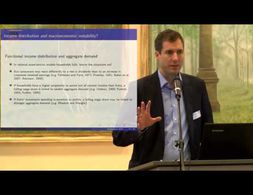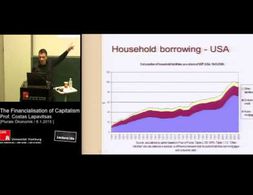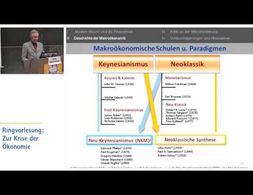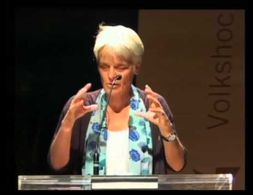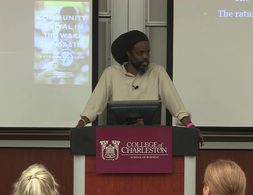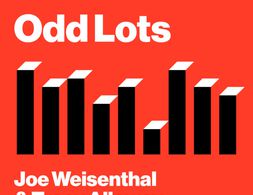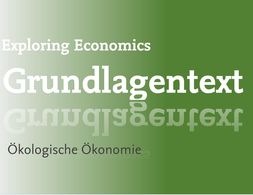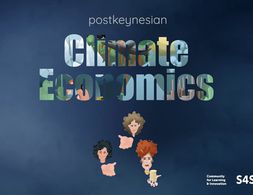513 Ergebnisse
Neoclassical economics focuses on the allocation of scarce resources. Economic analysis is mainly concerned with determining the efficient allocation of resources in order to increase welfare.
An essay of the writing workshop on Nigeria’s Readiness for and the Effect of the Fourth Industrial Revolution
This course will survey contemporary heterodox approaches to economic research, both from a microeconomic and a macroeconomic perspective. Topics will be treated from a general, critical, and mathematical standpoint.
The first day of the workshop is intended to initiate students to the foundational concepts of ecological economics. Ecological economics is an ecological critique of economics, applying the energetics of life to the study of the economy. It also investigates the social distribution of environmental costs and benefits. It does so by deconstructing concepts that are taken for granted like “nature” or “the economy”, excavating their ideological origins.
In diesem Video werden die Themen (Post-)Wachstum der gesamten Wirtschaft sowie einzelner Sektoren, die Rolle von Technologie im Umweltschutz, die internationale, lokale und auch individuelle Dimension von Umweltpolitik, die Rolle von Industrie und Politik und viele anderen umweltbezogenen Themen besprochen. Das Panel setzt sich aus Wissenschaftlern, einem Industrievertreter und einer Unternehmensgründerin zusammen. Die letzten 20 Minuten widmen sich der Diskussion.
In this keynote lecture during the conference „The Spectre of Stagnation? Europe in the World Economy“, Till van Treek presents research on how changes in income distribution lead to macroeconomic instability and crisis, focusing on currents accounts. Treek presents the relative income hypothesis in contrast to other mainstream and Post-Keynesian explanations. The relative income hypothesis proposes that aggregate demand increases and savings decrease with rising personal income inequality due to upward looking status comparison – but effects depend on the quantile where income inequality increases. Treek points to the importance of accounting for both income and functional income distribution and underlines his arguments with data comparing different pattern in Germany and the U.S.
Economist and politician Costas Lapavitsas: presents differing theoretical definitions of financialization, namely from Marxist and Post-Keynesian thinkers and compares their approaches. By presenting pattern and features of the economic and financial crisis, he interprets the latter as a crisis of financialization. Lapavitsas emphasizes his arguments by presenting data from the U.S. and Germany on the transformation of business, banks and households.
Zuerst kritisiert Prof. Krämer die moderne Makroökonomik mit repräsentativen Agenten. Dann gibt er einen Überblick zu den Denkschulen der Makroökonomik seit Keynes. Es folgt eine Kritik an der Mikrofundierung und zum Schluss werden noch ein paar Beispiele heterodoxer bzw. Post Keynesianischer Makro erläutert.
In diesem Video spricht die Journalistin Ulrike Hermann vom Anfang und Ende des Kapitalismus. Zunächst erläutert Hermann, was unter Kapitalismus und Kapital verstanden werden kann. Anschließend grenzt sie Kapitalismus vom Begriff Marktwirtschaft ab. Neben Errungenschaften des Kapitalismus nennt sie insbesondere dessen Krisenhaftigkeit und folgende Gefährdungen für die Demokratie als Gründe, warum über eine Transformation zu einer post-kapitalistischen Wirtschaftsordnung nachgedacht werden muss. Der Vortrag endet bei Minute 54.
In this talk, Virgil Henry Storr, a Research Associate Professor of Economics in the Department of Economics at George Mason University, talks about his research into to post-disaster recovery and the role that social entrepreneurship plays in rebuilding the communities and social networks that get disrupted, or entirely eliminated.
In this post, Rethinking Economics sets out what it means to decolonise economics education and how we can do that. The article first breaks decolonising down into a "mind-set" and a "process", then applies this process to economics education. It finishes with a reading list and some suggested actions to get you started decolonising economics today.
This Blog Post describes the U.S. federal reserve money system from the perspective of the Modern Monetary Theory (MMT). Therefore it presents a theory of money creation, gives simple examples how this influences the economy and the historical process of why the monetary system of the US has developed this way.
The plumbing of the financial system is coming under strain like never before. On this week’s podcast, we speak with two legendary experts on how the money system works: Zoltan Pozsar of Credit Suisse and Perry Mehrling of the Frederick S. Pardee School of Global Studies. They explain the extreme level of stress we’re seeing, what the Fed has done to alleviate, what more needs to be done, and what the post-crisis future may look like.
This paper presents an overview of different models which explain financial crises, with the aim of understanding economic developments during and possibly after the Great Recession. In the first part approaches based on efficient markets and rational expectations hypotheses are analyzed, which however do not give any explanation for the occurrence of financial crises and thus cannot suggest any remedies for the present situation. A broad range of theoretical approaches analyzing financial crises from a medium term perspective is then discussed. Within this group we focused on the insights of Marx, Schumpeter, Wicksell, Hayek, Fisher, Keynes, Minsky, and Kindleberger. Subsequently the contributions of the Regulation School, the approach of Social Structures of Accumulation and Post-Keynesian approach, which focus on long-term developments and regime shifts in capitalist development, are presented. International approaches to finance and financial crises are integrated into the analyses. We address the issue of relevance of all these theories for the present crisis and draw some policy implications. The paper has the aim to find out to which extent the different approaches are able to explain the Great Recession, what visions they develop about future development of capitalism and to which extent these different approaches can be synthesized.
Understanding the financial crisis from four very different economic theories: Social Economics, Institutional Economics, Post Keynesian economics.
The Routledge Handbook of Heterodox Economics presents a comprehensive overview of the latest work on economic theory and policy from a 'pluralistic' heterodox perspective.
Contributions throughout the Handbook explore different theoretical perspectives including: Marxian-radical political economics; Post Keynesian-Sraffian economics; institutionalist-evolutionary economics; feminist economics; social economics.
As the current economic crisis spreads around the globe questions are being asked about what king of capitalist or post-capitalist economy will follow. There is increasing talk of the need for stringent economic regulation, the need to temper greed and individualism, to make the economy work for human and social development.
How did the industrialized nations of North America and Europe come to be seen as the appropriate models for post-World War II societies in Asia, Africa, and Latin America? How did the postwar discourse on development actually create the so-called Third World? And what will happen when development ideology collapses? To answer these questions, Arturo Escobar shows how development policies became mechanisms of control that were just as pervasive and effective as their colonial counterparts.
The Austrian tradition in economic thought had a profound influence on the development of post-war economics including neoclassical orthodoxy, game theory, public choice, behavioral economics, experimental economics and complexity economics.
Management in einer Moderne, die von Überbietungszwängen beherrscht wird: Das ist „post-archimedisches Management“, Management ohne festen Punkt und sicheren Grund, das gleichwohl „die Erde bewegt“; Management im Zeichen radikaler Kontingenz, eskalierender Pfadabhängigkeiten und der Unmöglichkeit, die Kluft der Kontingenz mit perfekten oder auch nur halbwegs sicheren Begründungsbrücken zu überbauen.
This lively introduction to heterodox economics provides a balanced critique of the standard introductory macroeconomic curriculum. In clear and accessible prose, it explains many of the key principles that underlie a variety of alternative theoretical perspectives (including institutionalist economics, radical economics, Post Keynesian economics, feminist economics, ecological economics, Marxist economics, social economics, and socioeconomics).
The book provides an excellent comparative perspective on New Keynesian "New Consensus" economics and Post-Keynesian Economics at a beginner level. It also offers an interactive tool to understand how the economic models work, especially from a heterodox / pluralist perspective.
Das Paradigma der ökologischen Ökonomie (Ecological Economics) stellt einen multidisziplinärern Ansatz dar, um ein ganzheitliches Bild der wachsenden ökologischen Probleme und ihrer Verflechtungen mit der Ökonomie zu erhalten. Sie beschäftigt sich mit Ressourcenknappheit, Umweltverschmutzung, Klimawandel, Nahrungsmittelknappheit oder sozialer Ungleichheit. Hierbei werden wissenschaftliche Disziplinen wie Ökologie, Ökonomie, Physik und zunehmend auch andere Sozial- und Geisteswissenschaften (z.B. Soziologie oder Philosophie) herangezogen, mit dem Ziel, im ökonomischen Denken auch ökologische, ethische, politische, institutionelle und soziale Faktoren zu berücksichtigen. In diesem Zusammenhang werden nichtzuletzt deshalb auch wesentliche Grundannahmen der orthodoxen Ökonomie sehr kritisch betrachtet (Constanza 1989, Ayres 2008, Spash 2010).
This video provides a brief introduction to post-keynesian economics and how the school of thought would tackle climate change.
This content submission has two parts: (1) a link to the post by Wolf Richter on deterioration of US subprime credit card debt and loans, driven in part by the overuse of hedonic quality adjustments in the Consumer Price Index (CPI) used by the US Bureau of Labor Statistics, and (2) to introduce Exploring Economics to the website Naked Capitalism, which is an effort to promote critical thinking through the medium of a finance and economics blog and fearless commentary.
Quinn Slobodian a historian of modern Germany and international history analysis of current development in the Mont Pèlerin Society and therefore neo-liberalism. He sees neo-liberalist thinkers less as believers in the self-healing power of markets, but more as ordo-liberal Globalists who wanted to protect the markets from post-war politics and especially mass democracy. Their goal of global capitalism is still strong, however sceptics in the Mont Pèlerin Society are rising, which see international migration as a threat to Globalisation. Therefore, turning neo-liberal policies away from international institutions like the EU back towards the national states as new defenders of the markets as well as international trade and investments.
(A development which can be seen in the Friedrich A. von Hayek-Gesellschaft and especially in the "liberal" wing of the German rightwing populist party AfD)
In this short video, John Holmwood problematizes Marxian Economics from a post-colonial perspective.
This blog post reviews "Democratizing Finance", an edited volume that analyses and provides policy proposals to ensure that the financial system serves the public good. Mquzama undertakes the task of summarising the main takeaways from each essay in the book as well as an exposition of its shortfalls. While he acknowledges the necessity of the book's reimaging capitalism and the financial system in a way that is practical within the current economic and political structures, he also highlights its failure to look beyond the United States of America.
It is perhaps fitting that the seriousness of the coronavirus threat hit most of the Western world around the Ides of March, the traditional day of reckoning of outstanding debts in Ancient Rome. After all, problems and imbalances have accumulated in the Western capitalist system over four decades, ostensibly since it took the neoliberal road out of the 1970s crisis and kept going along it, heedless of the crises and problems it led to.
With the onset of an economic crisis that has been universally acknowledged since the end of March, two main questions arise: To what extent is the corona pandemic the starting point (or even the cause) of this crisis? And secondly: can the aid programmes that have been adopted prevent a deep and prolonged recession?
In this overview paper, Laura Porak reviews the history of industrial policy in the European Union before the background of a Cultural Political Economy approach.
Steve Keen analyses how mainstream economics fails when confronted with the covid-19-pandemic. Mainstream economics has propagated the dismantling of the state and the globalization of production - both of which make the crisis now so devastating. More fundamentally, mainstream economics deals with market systems, when what is needed to limit the virus’s spread is a command system.
Wir nutzen Cookies. Klicke auf "Akzeptieren" um uns dabei zu helfen, Exploring Economics immer besser zu machen!




